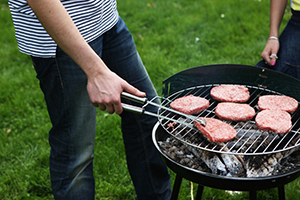Dangers Can Cause Summer Burns
 From the not-so-simple sunburn to accidents while working on your car, John Griswold,
M.D., Texas Tech Physicians – Surgery, said this season has its own special variety
of burns, all of which can land the unwary in the emergency room.
From the not-so-simple sunburn to accidents while working on your car, John Griswold,
M.D., Texas Tech Physicians – Surgery, said this season has its own special variety
of burns, all of which can land the unwary in the emergency room.
“Not surprisingly, sunburns are the most common burns seen in the emergency room during the summer,” Griswold said. “Be sensible in the sun. Use sunscreen, especially on fair skin. Damage done to the skin in the teen years will not show up until a person reaches his or her 40s, 50s and 60s in the form of non-life threatening damage of aged and wrinkled skin. More serious damage comes in the form of skin cancer.”
Griswold, who also is the medical director of the UMC Timothy J. Harnar Regional Burn Center, said if you or your children do get sunburned this summer, bathing or soaking with diluted vinegar is soothing and will take out the heat. Keep the burn well moisturized. He said to seek medical attention for sunburns that cause fever or have a drainage that is not clear fluid.
Griswold adds there are many other dangers of the summer heat that can cause injuries. A burn is damage to your body's tissues caused by sunlight, chemicals, electricity, fires, flammable liquids and gases, heat or steam from hot liquids. Automobile burns account for a significant number of summer burns.
“When your car overheats, wait until the car cools down to remove the radiator cap,” Griswold said. “Removing the radiator cap while the car is hot may result in an explosion of 212 degree Fahrenheit water. Adding gas to a hot lawn mower or weed eater may also cause an explosion and with it comes possible serious burn injuries.”
Outside grilling is a fun family activity that can be quickly ruined by the impatient griller dousing charcoal with gasoline, causing an explosion and an end to the party.
Also, car door handles, buckles on seatbelts, steering wheels, dashboards, leather or vinyl seats can all cause painful contact burns when the car has been in the sun. Be especially careful of buckles on child restraint seats. Children can suffer more serious burns than adults from the same thing because they have tender skin. Investing in a windshield shade may cool your car down a few degrees.
According to the National Institute of General Medical Sciences, there are three types of burns:
- First-degree burns damage only the outer layer of skin
- Second-degree burns damage the outer layer and the layer underneath
- Third-degree burns damage or destroy the deepest layer of skin and tissues underneath
Burns can cause swelling, blistering, scarring and, in serious cases, shock and even death. They also can lead to infections because they damage your skin's protective barrier. Treatment for burns depends on the cause of the burn, how deep it is and how much of the body it covers.
Griswold said many times antibiotic creams can prevent infections. But for serious burns, treatment may be needed to clean the wound, replace the skin and make sure the patient has enough fluids and nutrition.
“A burn that does not hurt is worrisome,” Griswold said. “This could mean a third degree burn and should be evaluated by a physician. A burn not healing within several days or developing fever, are also signs that the burn should be evaluated by a physician.”
When the weather is hot, be sensible, wear sunscreen, keep gasoline away from hot surfaces and flames and if something is too hot, don’t touch it. Keep your summer fun from turning into a summer nightmare.
Related Stories
Celebrating Veterans: TTUHSC’s General Martin Clay’s Legacy of Service and Leadership
From his initial enlistment in the Army National Guard 36 years ago to his leadership in military and civilian health care management roles, Major General Martin Clay’s career has been shaped by adaptability, mission focus and service to others.
Texas Tech University Health Sciences Center School of Nursing Named Best Accelerated Bachelor of Science in Nursing Program in Texas
The TTUHSC School of Nursing Accelerated Bachelor of Science in Nursing (BSN) program has been ranked the No. 1 accelerated nursing program in Texas by RegisteredNursing.org.
TTUHSC Names New Regional Dean for the School of Nursing
Louise Rice, DNP, RN, has been named regional dean of the TTUHSC School of Nursing on the Amarillo campus.
Recent Stories
The John Wayne Cancer Foundation Surgical Oncology Fellowship Program at Texas Tech University Health Sciences Center Announced
TTUHSC is collaborating with the John Wayne Cancer Foundation and has established the Big Cure Endowment, which supports the university’s efforts to reduce cancer incidence and increase survivability of people in rural and underserved areas.
TTUHSC Receives $1 Million Gift from Amarillo National Bank to Expand and Enhance Pediatric Care in the Panhandle
TTUHSC School of Medicine leaders accepted a $1 million philanthropic gift from Amarillo National Bank on Tuesday (Feb. 10), marking a transformational investment in pediatric care for the Texas Panhandle.
Texas Tech University Health Sciences Center Permian Basin Announces Pediatric Residency Program Gift
TTUHSC Permian Basin, along with the Permian Strategic Partnership and the Scharbauer Foundation, Feb. 5 announced a gift that will fund a new pediatric residency.
